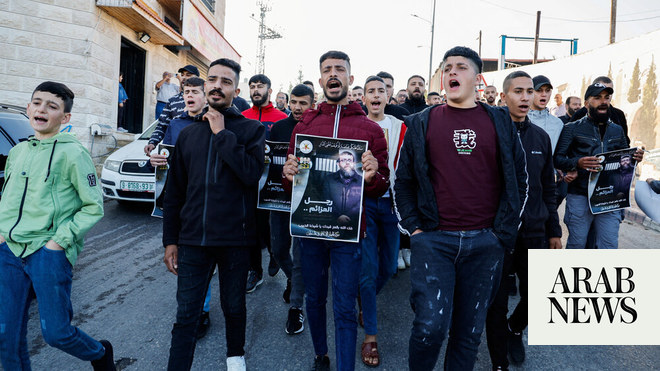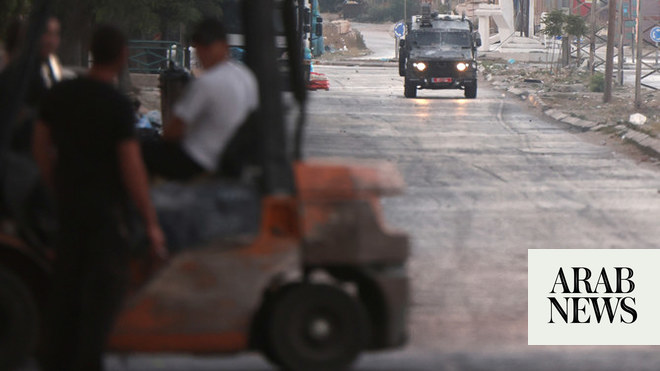
Route 60, the north-south artery that carves its way through the West Bank, is both the lifeblood of the region and a source of daily fear.
Flanked in parts by 2.5-metre-high (8ft) separation barriers, military checkpoints and watchtowers crewed by Israeli snipers, the 146-mile highway that starts and finishes in Israel but passes Hebron and Bethlehem in the West Bank, has been the scene of many fatal attacks and violent clashes.
For a Palestinian teenager such as Obaida Akram Abdurahman Jawabra, the road was a route to opportunity and a source of restriction.
Growing up in al-Arroub refugee camp just north of Hebron, Obaida, 17, was training to become a chef and travelled daily from the camp through Route 60 to college in Beit Jala. When he was 15, he became the subject of an eponymous short film by the journalist Matthew Cassel in 2019, in which he spoke about running the gauntlet of Israeli military security on a daily basis. “The problem is Route 60 and how to cross it,” the teenager said.
His fear was rooted in experience; at 14, Obaida was arrested while walking to a shop, and said he was blindfolded and beaten while detained. He was accused of throwing stones, but acquitted and released without charge. Six months later, in July 2018, he was arrested again, accused of throwing stones and a molotov cocktail. He agreed to a plea deal and was imprisoned for four months. He was arrested a third time, in 2019, and released without charge.
Obaida’s story is typical of thousands of Palestinian children in the West Bank. Children can be imprisoned from the age of 12 under military law, and the detention of 15- to 17-year-olds is common, says Yael Stein, head of research at the Israeli human rights organisation B’Tselem and author of a 2018 report on the arrest of minors. Most pursue a plea bargain, often under intimidating circumstances, says Stein.
After his release, Obaida focused on training to become a chef, which he saw as a way of escaping his circumstances. He was a few weeks from turning 18 and graduating from his course when he was shot and killed by the Israel Defense Forces (IDF) on 17 May.
Details of exactly what happened in the moments leading up to his death are unclear but witnesses have described him being shot from about 70 metres away, near the entrance to al-Arroub on Route 60. Witnesses say an ambulance was reportedly unable to reach him, as the route had been blocked by soldiers, which the IDF denies.
Obaida died during one of the many demonstrations across the West Bank during the recent 11-day conflict that cost the lives of more than 250 in Gaza, including 66 children, and 12 in Israel, including two children.
Four days after Obaida’s death, a ceasefire was declared on 21 May, but the unrest continues. On Monday Israeli police shot dead a 17-year-old attacker who stabbed an Israeli soldier and civilian in Jerusalem on the edge of the Sheikh Jarrah neighbourhood. In Hebron, the city nearest Obaida’s home in al-Arroub, there have been reports of further attacks by settlers on Palestinians and their property.
“Since the ceasefire there has been teargas, arrests of Palestinians at al-Aqsa mosque, harassment and the [Israeli police at the] cement blocks in Sheikh Jarrah are not allowing Palestinians to pass, while settlers can pass freely,” says Rania, from Jerusalem, whose son was a classmate of Obaida’s. “I was passing through Herod’s Gate [in Jerusalem’s Old City] today thinking we really do live in a war zone – it looks like something out of a Hollywood war movie.”
And a ceasefire means little change to the day-to-day life of boys such as Obaida in the West Bank.
The Palestinian prisoners’ rights group Addameer estimates that about 700 Palestinian children are arrested by Israeli forces every year and that there are 160 inmates under-18 in Israeli prisons. Children have also occasionally been arrested by the Palestinian Authority, which conducts its own crackdowns on opposition activists and has been accused of torturing prisoners, including minors. The authority did not respond to a request for comment.
At least 61 children were arrested as Israeli police stepped up raids in mid-April following confrontations in and around East Jerusalem – including a 13-year-old arrested at Damascus Gate who was beaten by police, according to Addameer.
Most children imprisoned under the Israeli military legal system, like Obaida, are accused of throwing stones. Six children, including Obaida, have reportedly been killed by the IDF this year, four in the past three weeks.
“Obaida, and I say this with complete sorrow, is just one name in a long list of many,” said the Palestinian writer Mariam Barghouti in an interview last week.
Avner Gvaryahu, executive director of Breaking the Silence, an organisation of Israeli military veterans, describes a system of “inequality” in the treatment of Palestinian children by the IDF.
“What we’ve seen come up over and over again, especially when it comes to stone-throwing, or even in more extreme cases of violence, is the non-essential use of force. I’m not condoning stone-throwing, it has harmed Israeli citizens, but … we’ve seen cases where there’s not sufficient reason to shoot – and definitely not kill.”
Gvaryahu says IDF soldiers who use excessive force operate with “high levels of impunity”, adding “indictments are very rare, and the sentencing will be minimal”.
A report by Human Rights Watch accusing Israel of imposing policies that amount to apartheid, found that: “Israeli forces regularly arrest children during night-time raids, interrogate them without a guardian present, and hold those as young as 12 in lengthy pretrial detention.” Israel’s foreign ministry has previously accused Human Rights Watch of a “longstanding anti-Israeli agenda” and called the report a “propaganda pamphlet” that had “no connection to facts or reality on the ground”.
Ayed Abu Eqtaish, from Defense for Children International – Palestine, the human rights organisation behind the film featuring Obaida, said: “If you go to Ofer military court [near Ramallah], you will see many Palestinian boys, just like Obaida Jawabra, standing trial before a military detention system that systematically ill treats and abuses them, denies them due-process rights, and hands nearly every child a guilty verdict. It is a reality that is made no more acceptable by its predictability and frequency.”
A spokesperson for the IDF told the Guardian that the military had opened an investigation into Obaida’s death. They said: “In recent years, many Palestinian minors have been involved in carrying out terrorist attacks against Israeli civilians and IDF troops, as well as involved in violent riots including life-threatening acts, such as throwing molotov cocktails and explosive devices.
“IDF troops take various measures in the face of these actions, in order to prevent harm to human life while endeavouring to minimise the possibility of harm to minors.”
The spokesperson said the IDF acted in accordance with Israeli and international law when detaining minors, and that “there is an absolute prohibition on the use of violence or any other inappropriate treatment”.












